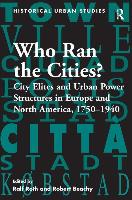This volume furthers our understanding of who actually ran cities in the eighteenth, nineteenth and twentieth centuries, and develops greater understanding of the relationship between elite and "power" in cities. To develop answers, two fields of research, which have often remained separate, have been brought together: the economic, social and cultural history of elite and the political history of power resources and decision-making. By looking at specific case studies through the lens of these issues, the volume will encourage the reader to challenge common perceptions of a monolithic elite and to replace them with a more sophisticated view of urban power as an interplay between various economic, social, political and cultural elite groups.

